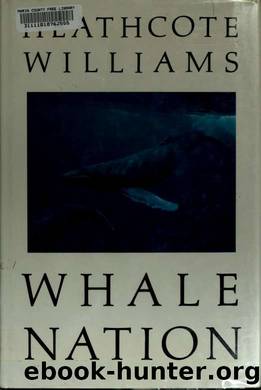Whale nation by Williams Heathcote

Author:Williams, Heathcote
Language: eng
Format: epub
Tags: Whales, Whales, English poetry, Whales, Dolphins
Publisher: New York, N.Y. : Harmony Books
Published: 1988-04-15T00:00:00+00:00
CUi ll.\(.. Ur A WH.\LE-r.ATHERIXr, THE SI'EiniACETl FROM THE HEAD.
The Spermaceti oil gives the clearest and most beautiful flame of every substance known in nature. We are all surprised that you prefer darkness and consequent robberies, burglaries, and murders in your streets to the receiving, as a remittance [for colonial trade], our spermaceti oil. The lamps around Grosvenor Square, I know, and in Downing Street, too, I suppose, are dim by midnight, and extinguished by two o'clock in the morning and chase away, before the watchmen, all the villains, and save you the trouble and dangfer of introducing a new police into the city.
John Adams, American Minister to England, to William Pitt, May 1785, in The Works of John Adams, vol. viii, p. 309, Boston, 1820
Sperm oil was needed for lighting and heating all over the world . . . and during the middle of the nineteenth century the Yankee Sperm whaling entered upon its golden age . . . F. D. Ommanney, Lost Leviathan, London: Hutchinson, 1971
The whaling interest, taking into consideration the extent to which it has been carried on by our countrymen, may be almost claimed as peculiarly American . . . Our whaling fleet may be said at this very day to whiten the Pacific with its canvas, and the proceeds of this fishery give comfort and happiness to many thousands of our citizens.
Lieut. Charles Wilkes, Narrative of the United States Exploring Expedition, vol. 5, Philadelphia, 1845
When information arrived in Hull, Yorkshire, about ships engaged in the whale fishing it would be printed in the local paper, the Hull Advertiser and Evening Gazette; details of each ship's catch would be hsted individually, but totals would also be given. For example, in 1804 it was pubHshed that 24 vessels had returned from Greenland between 20 July and 20 August, and that their total catch comprised 247 whales . . . they had 4,649 butts of blubber, 1,686 tuns of oil and 50^2 tons of fins. Sixteen ships had returned from the Davis Strait in the same period with a total catch of 150 whales. . . they had 5,827 butts of blubber, 2,089 tuns of oil and 93^2 tons of fins. This made a grand total of 397 whales . . . 10,476 butts of blubber, 3,775 tuns of oil and 144 tons of fins from 40 ships arriving in one month, and gives some idea of the size of the industry.
Thirty tons of oil might be extracted from the blubber of a large whale, and a whale might be worth £2000 in all, the actual amount depending on its size.
The first Hull street directory, published in 1791, shows the following traders associated with the use of whaling products: five candle manufacturers, four stay-makers, one umbrella-maker and one brush-maker, and two firms of oil merchants, one of which was G. and J. Eggington, who were well known as whaling ship owners.
A different picture is provided by the directory for 1826, when the whale fishing industry had reached its peak .
Download
This site does not store any files on its server. We only index and link to content provided by other sites. Please contact the content providers to delete copyright contents if any and email us, we'll remove relevant links or contents immediately.
| Ancient, Classical & Medieval | Anthologies |
| British & Irish | Japanese & Haiku |
| Love Poems | Regional & Cultural |
| Themes & Styles | United States |
| Women Authors |
The Universe of Us by Lang Leav(14411)
The Sun and Her Flowers by Rupi Kaur(13786)
Adultolescence by Gabbie Hanna(8173)
Whiskey Words & a Shovel II by r.h. Sin(7499)
Love Her Wild by Atticus(7256)
Smoke & Mirrors by Michael Faudet(5546)
Wiseguy by Nicholas Pileggi(4648)
The Princess Saves Herself in This One by Amanda Lovelace(4534)
Love & Misadventure by Lang Leav(4377)
Milk and Honey by Rupi Kaur(4252)
Memories by Lang Leav(4194)
Good morning to Goodnight by Eleni Kaur(3820)
Bluets by Maggie Nelson(3760)
Too Much and Not the Mood by Durga Chew-Bose(3719)
Algedonic by r.h. Sin(3533)
Pillow Thoughts by Courtney Peppernell(3475)
The Poetry of Pablo Neruda by Pablo Neruda(3405)
HER II by Pierre Alex Jeanty(3191)
Stuff I've Been Feeling Lately by Alicia Cook(3067)
